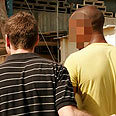
Convicted soldier: I feel like a war criminal
Prosecution demands prison sentence for Givati troops who forced Palestinian boy to open bags thought to contain explosives, while Maj-Gen Uzi Dayan demands a stop to probes against soldiers who fought in Cast Lead
A sentencing hearing was held for two Givati soldiers convicted of endangering a Palestinian boy during Operation Cast Lead on Monday, amid a large crowd of friends, family, and supporters. After the prosecution demanded the two be incarcerated, one defendant said he felt "like a war criminal".
Major-General (Res.) Uzi Dayan spoke at the hearing. "I have come here to show support for combat soldiers and to stress that they are not criminals," Dayan, who heads the National Security Council, explained.
"So far 600 soldiers have passed through the military police's hands, and it needs to be stopped. The military police does not investigate combat troubles," he told a room full of friends and family who had come to support the troops. The crowd was so large that some were forced to wait outside.
The two soldiers were found by the court to have overstepped their authority by letting a 9-year old boy open bags believed to contain explosives during a raid on a building in Gaza City's Tel al-Hawa neighborhood.

'We are all Goldstone's victims', say shirts (Photo: Avi Rokach)
At the sentencing hearing, the prosecution asked that the soldiers be incarcerated. "The message should be clear: This is not at all a simple case," the prosecutor told the court.
Fighting to fight, in reserves
But the defendants requested leniency. "I was placed at the forefront of terror, a barrier between the state and its enemies, between your loved ones and those who seek to harm them," one of the soldiers said. "Nothing was done on my part for personal gain or out of evil intentions."
The other defendant described his family, which boasts 11 children and parents who emigrated from Ethiopia. "They wanted me to stay close to home, but I volunteered to enlist into combat service. Now I am being treated like a war criminal and I will have to pay dearly," he said.
Both soldiers were most upset by their demotions, and the fact that their conviction will prevent them from serving in the reserves.
"For three years I struggled to earn these ranks. I want to be in the reserves in order to serve my country," one of the soldiers told the court, asking for a reprieve.
Their attorney, Ilan Katz, inveighed against the prosecution for the sentence it had requested. "The prosecutor is adding insult to injury by quoting the issue of human dignity towards the victim. I believe IDF soldiers' human dignity should come first," he said. "Their dignity was trampled."
Katz also reminded the court that the Palestinian boy emerged unscathed from the incident. "He may have been traumatized, but no one is asking how much soldiers are traumatized by being place on the defendant's stand," he said.
'They gave up on a lot to enlist'
"We respect the court's verdict, but this does not justify such severe punishment. I ask the court to consider the fear that grips soldiers during times of war, that they be given a more symbolic punishment such as a warning and be allowed to serve in the reserves.
Yair Lichtman, who was summoned as a witness for the defense, said, "These are two guys who gave up on a lot in order to enlist and be combat soldiers. They are from struggling families – new immigrants."
He added that the police had tricked them into answering questions. "They were summoned to a meeting at a shopping mall, and then it turned out they were being interrogated. This is not how you treat those returning from battle," Lichtman said.
Brigadier-General (Res.) Moni Chorev, the former commander of the Givati Brigade, said it was hard for him to accept that two soldiers sent to fight in Gaza would soon have a criminal record.
"This journey of accusations on which the military police have embarked is difficult for me – this giving of testimony that is even harsher than the punishment itself. It must be stopped," he said.
"They didn't think there were explosives in there. It doesn't make sense that they would tell someone to open (the bags) if they thought there were explosives inside."
- Follow Ynetnews on Facebook










